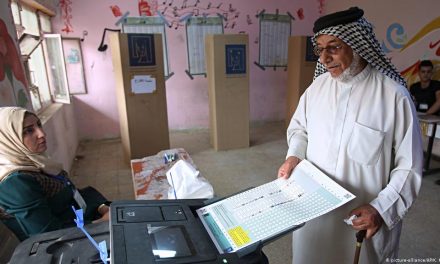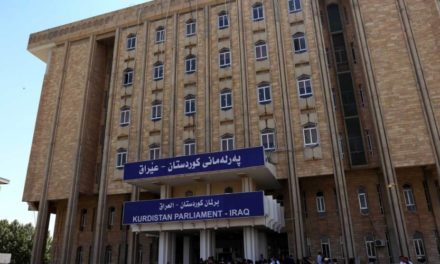(From left to right: Prime Minister Mustafa Al-Kadhimi, Chief of Staff of the Popular Mobilization Forces Abu Fadak Al-Mohammedawi and National Security Advisor Qasim Al-Araji. Photo: Social Media)
The adage says that a picture is worth a thousand words. Well, I have a few hundred on yesterday’s picture posted above.
The picture is of Prime Minister Mustafa Al-Kadhimi, Chief of Staff of the Popular Mobilization Forces (PMF) Abu Fadak Al-Mohammedawi and National Security Advisor Qasim Al-Araji in Diyala at the parade commemorating the seventh anniversary of the establishment of the PMF.
Why do I have so much to say about a single picture? Allow me to explain.
First, the photo was not officially released by the Prime Minister’s Office (PMO). In fact, no photographs or videos were released on any of the PMO platforms commemorating the prime minister’s presence at the event. As the last thirteen months have shown, this prime minister is not camera shy and the simplest of activities will yield several photos from multiple angles. For example, the televised interview he gave on Thursday with national public broadcaster Al-Iraqiya resulted in twenty photographs being published across the PMO’s Facebook, Telegram, Twitter and WhatsApp pages. This is an indication that the parade is one that he reluctantly attended and does not wish to draw attention to, otherwise he would have published more than just a text-only tweet in Arabic and Kurdish.
Second, the photograph reminds me of an old Iraqi saying, which translates to “putting someone under your armpit” or to control someone. The fact that Mohammedawi has his arm around the commander-in-chief’s shoulder is not a coincidence, especially if taken with my first point above. Someone clearly wanted to take advantage of the imagery and try to convey who is really in charge. It cannot be lost on anyone that this photograph is taken exactly one month after PMF Commander Qasim Musleh’s arrest and subsequent standoff between Kadhimi and Mohammedawi inside the International Zone (IZ) in Baghdad.
Third, the photograph will be used by some to indicate that fences have been mended and that the Mosleh incident is simply water under the bridge between the PMF and their commander-in-chief, and that such incidents are unlikely to reoccur. Do not be fooled by such wishful thinking as we can recall that one of Kadhimi’s first outings made as commander-in-chief in 2020 was to the PMF headquarters in the IZ and he made sure his team published several photos of him wearing a jacket with the PMF logo on it. That photo did not stop thirteen months of tension and unnecessary animosity between the PMF and PMO and neither will this one.
Finally, this photo speaks volumes to the professionalism (or lack thereof) of the PMF’s leadership. You will never see officers from the Iraqi Army or Federal Police lay their arm around the minister of defence or minister of interior, let alone the commander-in-chief, not even outside working hours when they are not in uniform. They do not do this only because of their military training and discipline, but also out of respect for the chain of command and the minister’s positions. Thus, imagine the message this picture sends to the thousands of officers in the Iraqi Army, Counter-Terrorism Service, and Ministry of Interior who have gone through years of military academies, training and service to see someone who has never had formal military training put the commander-in-chief “under his armpit”. Unless that was exactly his intention.
Kadhimi knew his presence at the parade was a double-edged sword. If the parade took place without Kadhimi’s attendance, it would solidify the image that the PMF operates outside of his control and does not recognize his authority as commander-in-chief. If he attended, the PMF “shrine” brigades and Muqtada Al-Sadr’s Saraya Salam brigades would not be pleased with him as they intentionally boycotted the parade given their differences with Mohammedawi and other PMF brigades. Kadhimi now faces a situation in which the brigades that did not attend are likely unhappy with him, and those who did attend now see the prime minister as being under their control, rather than vice-versa.

Abdulameer Jawad
Abdulameer Jawad is a security analyst based in Sulaymaniyah, Iraqi Kurdistan.










